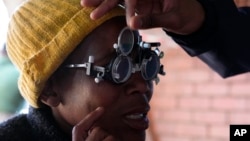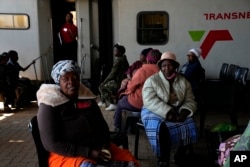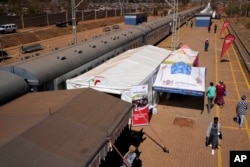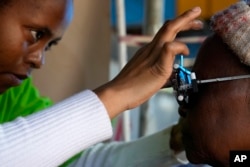In South Africa, a former passenger train now serves as a traveling medical center to provide health services to people in need.
The train is known as Phelophepa. In the Sesotho language, this means “good, clean, health.” It travels across South Africa to provide medical care to a mix of patients for whom usual heath care is unavailable or rare.
The train has been operating since South Africa’s government ended its racist system of apartheid in the early 1990s. The train carries medical professionals around the country, even to the most rural villages. Officials say the service helps at least 375,000 South Africans each year.
The care patients receive is separate from the government’s main public health care system. That system serves an estimated 84 percent of the population. But government insurance plans are too costly for many people to pay for. South Africa is also dealing with an unemployment rate of more than 32 percent.
The government has taken some steps to help get more of the nation’s population covered by public health insurance plans.
One of those came in May, when South African President Cyril Ramaphosa signed a law creating the country’s National Health Insurance Act. The law aims to provide financial assistance to millions of South Africans who do not currently have health insurance. The program gets support from private insurers.
However, the National Health Insurance Act has been hotly debated. Critics have said government officials have not yet said how much the program will cost or where that money will come from. Economists have predicted the government will have to raise taxes to finance the law. Critics have urged the government to instead fix the country’s public healthcare system.
Thethiwe Mahlangu has used the health train and recently spoke to The Associated Press about her experiences. She said local health clinics in her area – in the township of Tembisa, east of Johannesburg – cannot effectively serve her needs.
“There we are not treated well,” Mahlangu said. “We are made to sit in the sun for long periods. You can sit there from 7 a.m. until around 4 p.m. when the clinic closes.” She noted that when people ask about such issues, the medical workers say they simply need bigger hospitals.
When the train began in 1994, many Black people in South Africa still lived in rural villages with little availability to health centers. The time was a period of great change in South Africa. Today, the trains assist the growing populations of the capital, Pretoria, as well as Johannesburg, the country's economic center.
Shemona Kendiah is the train's manager. She told the AP trains can remain in one place for multiple days to see as many people as possible. Those going to major population centers – like Tembisa, for example – can end up staying up to two weeks. “The major metros are really struggling,” Kendiah said.
Mahlangu’s trip resulted in her getting a new pair of glasses. She was among hundreds of people who received health services from the train on its latest stop.
Another patient, Jane Mabuza, got a full health examination as well as services for her teeth. She said she hopes the train will be able to reach many more people in other areas. “Here on the train you never hear that anything has been finished,” Mabuza added.
I’m Bryan Lynn.
The Associated Press reported this story. Bryan Lynn adapted the report for VOA Learning English.
__________________________________________
Words in This Story
apartheid – n. a political system that existed in South Africa’s past in which the white minority enjoyed government power over Black people who were made to live separately
insurance – n. an agreement in which you pay a company to cover necessary costs in case there is an accident that causes damage or injuries












Forum